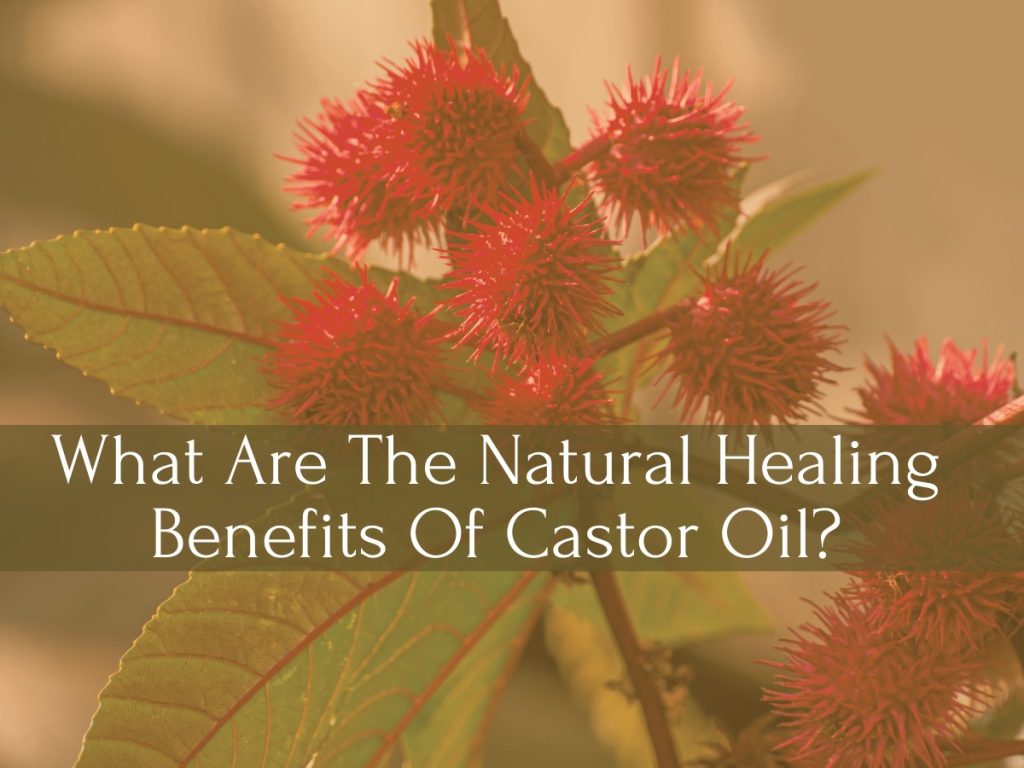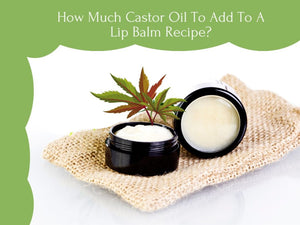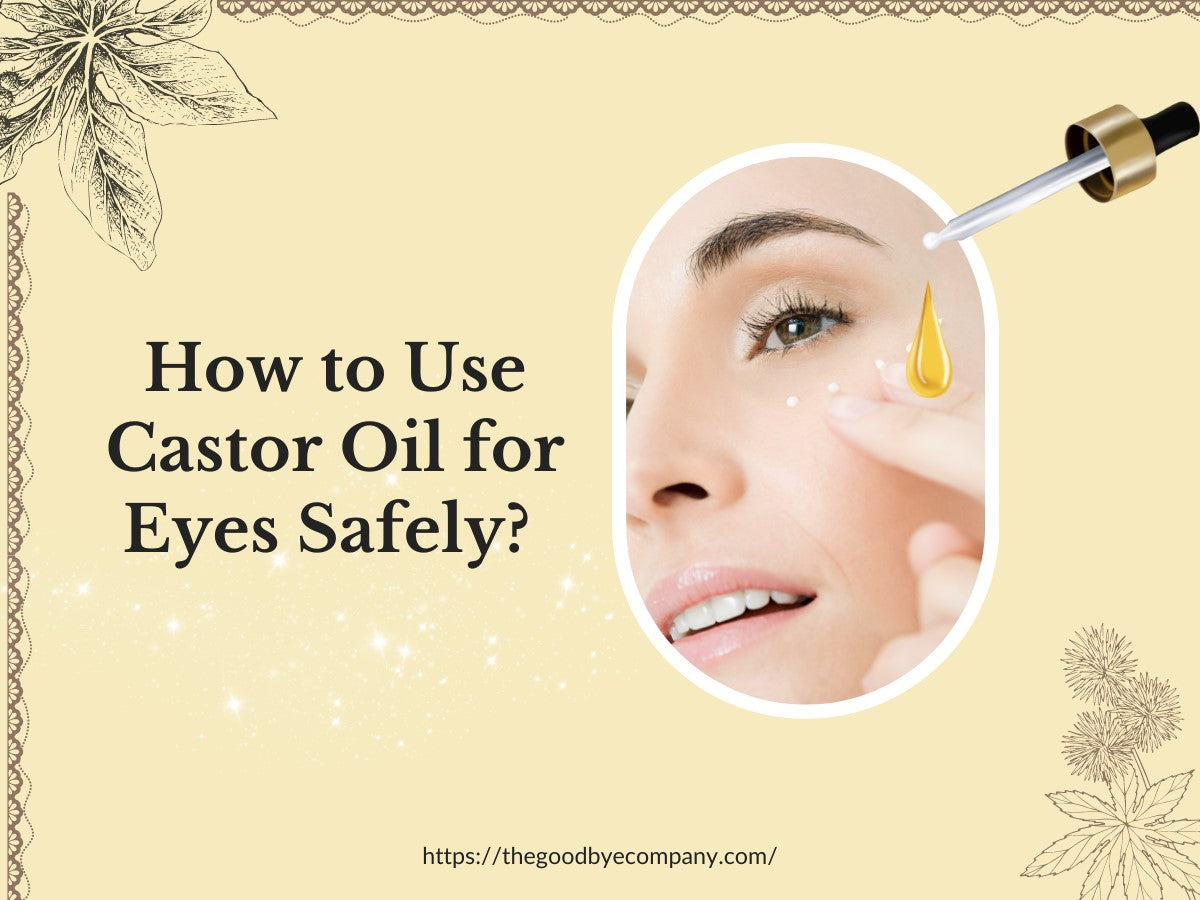Castor oil, botanically known as Ricinus oil, has a vegetable origin as it is naturally obtained from the castor beans of the Ricinus plant. The oil is a pale yellow liquid with a mild, distinctive scent and a viscous texture. This magical potion has several varieties due to the different extracting and refining processes. Popular castor oil forms include cold-pressed, hydrogenated, roasted, and low-moisture.
According to color disparity, two prominent variants are pale yellow cold pressed and Jamaican black castor oil. Cold-pressed Ricinus oil is mainly used for internal applications (considering the healthcare industry only) but also has some external uses. In contrast, JBCO is best suited for cosmetic and beauty purposes. But “What Are The Natural Healing Benefits Of Castor Oil?” To know it all, take a glance at the insightful description below.
Quick Insights
| Botanical Name | Ricinus oil |
| Common Names | Castor oil, Palm of Christ, Palma Christ |
| Composition | Triglycerides (ricinoleic acid), Fatty acids ( omega3,6,9), Phytosterols, Tocopherols (Vitamin E), Phospholipids, Carotenoids |
| Application | Internal & External |
| Dosage | No Universal dose; always ask your doctor. ( Safe dose: 15-60 ml for adult males) |
| Safety of Application & ingestion | Safe under prescribed dose for internal use Do a sensitivity test for external application |
| Legal status | Legal in the USA, OTC (over-the-counter drug) |
| Side Effects | Bloating, cramping, dizziness, nausea, skin rash (See in details later) |
Natural Healing Benefits Of Castor Oil
Here are some prominent pharmacological effects of castor oil, explained with the primary active principle responsible for such effects.
Anti-Inflammatory
Castor oil contains ricinoleic acid, which is a potent anti-inflammatory agent. Ricinoleic acid suppresses the release of pro-inflammatory mediators, reducing inflammation (redness, warmth, pain, swelling, and edema). Due to this incredible mechanism of action, castor oil is applied externally or sometimes ingested to manage bone aches, joint swelling, and sore muscles. Studies also report that castor oil treats skin inflammatory conditions, notably acne. But castor oil may aggravate acne for some due to its comedogenic properties.
Antioxidant
Vitamin E, richly packed in castor oil, is a powerful yet natural antioxidant. Antioxidants are those substances that scavenge free radicals in your body. Free radicals may be generated due to a number of mechanisms that cause body cells to undergo oxidative stress, leading to premature aging. So, using castor oil externally on your skin effectively minimizes fine lines, hides wrinkles, and makes your skin soft, subtle, and smooth.
Antimicrobial
Castor oil works great against bacteria and fungi due to the ricinoleic acid content, which has potent antimicrobial activity. Bacterial and fungal cell membranes are their most delicate part; ricinoleic acid disrupts their cell membranes and thus kills them and prevents them from spreading fast. So, after getting the prescription, you can use castor oil internally to treat mild antimicrobial attacks. However, topical use makes this magical oil OTC, and you can safely apply it to your skin with bacterial or fungal ich following a skin sensitivity test.
Analgesic
The anti-inflammatory action of castor oil is linked with its analgesic activity. Ricinoleic acid suppresses inflammatory mediators and activators to reduce swelling, and the body cells escape from stress, ultimately mitigating pain. Due to this mechanism of action, castor oil can be applied topically safely to reduce muscle, bone, and joint pain.
Laxative
Ricinoleic acid in Ricinus oil is also a potent laxative in addition to its anti-inflammatory, analgesic, and antimicrobial activity. When you ingest castor oil (within its safe oral dose), lipase (enzymes) in your body breaks the oil’s triglycerides and releases ricinoleic acid, activating EP3 and EP4 prostaglandin receptors.
Activation of these receptors leads to a calcium surge that stimulates smooth muscle contractions of the intestines, thereby promoting the flow of water and electrolytes down to the bowel and improving the consistency of your stool.
Hair Growth Promoter
Castor oil does not directly increase your hair length or volume. However, ricinoleic acid stimulates blood circulation on your scalp, providing more nutrition and oxygen to your hair follicles. Nourished hair roots grow faster, so castor oil is considered a growth promoter. Moreover, due to the rich vitamins and omega 3,6,9 fatty acids content, castor oil reduces split ends and makes our hair soft, silky, and smooth.
Also Read: Haircare Secrets Unleashed: Mastering Castor Oil Application and Leave-In Timing
Skin Rejuvenator
Vitamin E in castor oil is a potent antioxidant; it scavenges free radicals that promote premature aging, accelerate cell regeneration, and improve skin elasticity. So, applying this magical potion on your skin as a part of your daily face mask will do wonders. Nevertheless, always test sensitivity before using this viscous oil on your face. Do not use it if you have oily skin or activated acne since it may aggravate the condition due to its comedogenic properties.

Internal Applications Of Castor Oil
After understanding castor oil’s natural healing benefits and pharmacological effects when taken internally or orally, you may now quickly comprehend why and how castor oil is used to treat the following conditions.
Treats Constipation (FDA-Approved)
Since castor oil is a potent laxative, you can consume it orally to treat constipation. However, ingesting adequate dosage is crucial to avoid serious consequences such as increased loss of electrolytes and body fluids that may lead to severe diarrhea and even death.
Though its use for curing constipation is FDA-approved, you should never consume this oil unless prescribed by a healthcare professional. This is because overdosage of castor oil may increase abdominal cramps and bloating, worsening the constipated condition. Moreover, remember castor oil is never prescribed for long-term use; you can only take it shortly.
Labor Induction
In addition to being a good laxative, castor oil is a substantial labor inducer. Its mechanism of action is similar to the laxative action. However, castor oil’s use for inducing labor is not FDA-approved.
The reason is that scientific studies (on the action of castor oil for inducing labor) produce conflicting results. Some studies indicate that castor oil induces, initiates, and triggers labor, whereas a few pieces of evidence suggest an insignificant difference in childbirth timing. In a nutshell, you should never consume castor oil if you are pregnant, even for treating constipation.
Heals Arthritis
Due to the rich ricinoleic acid content, castor oil has potent anti-inflammatory properties. If you choose The Goodbye Company virgin castor oil, you’ll get about 92+% ricinoleic acid, so using this oil can reduce your arthritis pain. Some scientific studies also suggest that castor oil is more effective in alleviating pain and inflammation associated with arthritis than diclofenac sodium.
The reason is a benefit-to-risk ratio, i.e., diclofenac treatment resulted in mild gastritis and skin rash during the experimental study. In contrast, castor oil did not produce any side effects but only benefits (reducing inflammation and pain).
Oral Care
Castor oil has a long history of oral applications. It has been used for removing plaque and disinfecting dentures in Ayurveda practice since ancient times. Since then, many people have been swishing castor oil in their mouths for daily dental care. They also used to soak their dentures in a 10% castor oil solution known to eradicate Candida, Streptococci, and Staphylococci species.
This practice has always helped people with dentures and braces prevent frequent bacterial and fungal infections that might promulgate frequently owing to unhygienic practices, i.e., improper brushing and plaque accumulation. The former information is supported by a few pieces of evidence claiming castor oil’s effectiveness against Candida infections causing denture stomatitis.
Still, it is not a primary ingredient of oral care products, e.g., toothpaste and mouthwash. However, if you wear dentures, you can remove debris from your teeth by swishing castor oil or soaking your dentures in it.
External Applications Of Castor Oil
In addition to consuming castor oil in moderate amounts to get internal benefits, you can also apply it externally for topical advantages.
Promotes Wound Healing
Castor oil’s hydrating and moisturizing properties make it an excellent natural candidate to promote wound healing. It prevents your scars from drying out, cracking, and soring. Also, the analgesic and anti-inflammatory action of ricinoleic acid in the castor oil helps relieve the pain and inflammation, ultimately speeding up bruise healing.
You might have heard of Venelex, an ointment containing castor oil and Peru balsam as active ingredients; it is the best topical dosage to treat skin ulcers. This best castor oil ointment can heal diabetic, surgical, pressure ulcers, and burns. However, remember that balms like this are made of a combination of active pharmaceutical ingredients, including castor oil. Castor oil, as a booster ingredient, helps amplify the action of other essential principles. So, you must try castor oil balms with an extract that promotes wound healing rather than using the oil alone.
Manages Joint Pain
As discussed earlier, castor oil has excellent anti-inflammatory and associated analgesic effects. Due to these pharmacological actions, this magical oil is best to relieve arthritis and osteoarthritis pain when applied topically.
Skincare
Since The Goodbye Company castor oil contains vitamin E and omega 3, 6, and 9 fatty acids, it is a fantastic product for hydrating, moisturizing, and glass-clearing dull and dry skin. Also, the rich ricinoleic acid content helps mitigate skin inflammatory conditions, such as acne, psoriasis, and eczema, for many people.
Remember that castor oil is not suitable for all skin types, especially for oily skin, because this oil may prove to be comedogenic and may aggravate pore clogging. Therefore, always inspect your skin type before using castor oil. Moreover, analyze its action on your skin and discontinue use if it increases inflammation and rash.
However, if castor oil suits your skin and you wish to apply it to boost glow and hydration, dilute it with other beneficial oils such as almond, jojoba, or any other skin-friendly facial oil.
Hair Care
If you are the one who cares a lot about their hair, try using Jamaican black castor oil. Its composition speaks of its benefits for every hair problem; from dry hair to breakage, split ends to hair fall, dandruff to dullness, castor oil is the best solution. Just try making hair masks out of castor oil and love your shiny, voluminous, and split-ends-free hair. You can visit this blog to learn more about the benefits of castor oil for hair and DIY hair masks with castor oil.
Nevertheless, ask your dermatologist or haircare expert if castor oil will suit your scalp type and hair condition. It is because too much castor oil application can cause acute hair felting, a condition in which hair strands become thick, hard, rough, tangled, and twisted, giving a bird’s nest view.
Castor Oil Supplements
Castor oil is naturally obtained from castor beans, so all castor oil supplements, such as serums, soft gel capsules, and elixirs, are organic, vegan, and gluten-free. For the best results and maximum effectiveness, you should buy castor oil supplements from reputable brands. Also, read the labels carefully to avoid harming your body with chemical irritants, preservatives, and GMOs. You can get virgin castor oil, Jamaican black castor oil from The Goodbye Company, and soft gel capsules from Castrolax on Amazon.
Side Effects Of Castor Oil
Castor oil is a beneficial natural ingredient with multiple advantages and applications; it may cause harmful effects on your body. Nevertheless, the incidence of such side effects is very low and rare.
Common
Common side effects are mild unwanted symptoms that occur in a few populations. These are:
- Nausea
- Abdominal pain
- Dizziness
- Diarrhea
- Electrolyte Deficiency
- Vomiting
- Skin irritation
- Insomnia
Severe Yet Rare
According to NIH, too much ingestion of castor oil can be harmful. The reason is its potent laxative action that may result in diarrhea due to excessive intake. Loose stools or watery diarrhea, when it persists for long or remains untreated, can cause severe electrolyte depletion, leading to dehydration, unconsciousness, and coma. The following are some severe yet rare signs and symptoms that require immediate medical assistance.
- Chest pain
- Throat congestion
- Abdominal cramps
- Watery Diarrhea
- Fainting
- Hallucinations
- Shortness of Breath
- Unconsciousness
- Skin rash (Skin Hypersensitivity)
Overdosage & Toxicity
As discussed in the previous section, overdosage of castor oil can make you so sick that it may lead you to death bed. Not only this, if you ever intend to ingest castor beans, they may prove to be highly toxic due to the presence of ricin-which is a potential poison. Ricin overdosage can cause gastroenteritis, which may further lead to visceral damage and ophthalmological lesions.
Interactions & Precautions
Castor oil’s interactions with other pharmacological drugs, nutraceuticals, and herbal products are not well-documented. But that doesn’t mean such interactions do not exist. The reason is that castor oil’s laxative, anti-inflammatory, and analgesic properties may interact severely and unexpectedly with other drugs or drug-related products with similar or antagonizing actions. However, you must take the following precautions and measures to avoid harmful consequences.
- If pregnant, do not use castor oil topically or orally to avoid premature labor.
- Always consult your healthcare professional before using castor oil if breastfeeding your child.
- Keep your castor oil bottle away from the reach of children to prevent them from consuming excessive amounts.
- Always test castor oil on a small part of your skin to check if it does not irritate your skin because, for some, castor oil is a potent allergen and may cause contact dermatitis.
- Dilute castor oil before applying it topically because it is so thick and viscous that it may clog your scalp and skin pores. Also, it will be challenging to apply undiluted castor oil.
- Try making castor oil masks for hair and skin to achieve maximum benefits.
FAQs
Can Castor Oil Help You Lose Body Weight?
Castor oil is a laxative that helps clear your bowel fast and reduces appetite. So when you skip your meals, your excessive body fat melts to provide you with glucose via a process called gluconeogenesis and ultimately helps you lose weight.
How Much Castor Oil Should I Take?
There’s limited medical documentation on the recommended dosage of castor oil. Therefore, you should always ask your healthcare professional for a safe and accurate dosage according to the diagnosed indication. A few pieces of scientific evidence claim that an adult male can safely consume about 15-60 milliliters of castor oil to attain the required laxative action. However, its dosage form for other indications is not well-described.
How To Store Castor Oil Safely?
Always buy castor oil bottles packaged in an amber-colored glass bottle. It is to prevent any plastic introduction into your oil and to protect it from direct sunlight. Place your castor oil bottle in a cool, dry place, away from reach of children. Cap it tightly after use to prevent contamination and deterioration.
Outlook
In a nutshell, castor oil has numerous benefits, including advantages for general health, beauty, and lifestyle. Castor oil’s anti-inflammatory, analgesic, emollient, moisturizing, hydrating, and laxative actions have a wide range of applications. The magical oil comes in the form of soft gel capsules, ointments, and elixir. You can buy castor oil and its products from reputable brands that claim no-preservative, no-pesticide, no-GMO presence. Invest your time in this insightful description and learn in detail about castor oil’s natural healing benefits, its mechanism of action, applications, side effects, interactions, contraindications, precautions, and toxicity.










